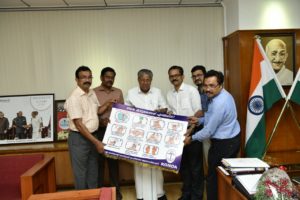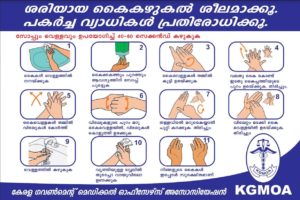Infection Control though Safe Health Habits

- Worsening antimicrobial resistance and rapid spread of infections diseases indicates the need of increasing awareness on personal hygiene and safety habits against communicable diseases. Hand washing is considered as the single most effective way to prevent the spread of infectious diseases. Hand hygiene is as important in routine domestic environment as in health care setups. Kerala Government Medical Officers’ Association takes up Infection Control though Safe Health Habits as our initial socially committed project.
- The following activities are proposed as a part of this initiative.
- Health care institutions
- To promote display of hand washing posters in all hands washing areas of Health care institutions.
- To conduct Health education sessions to care givers and general public in health care institutions with demonstration of hand washing technique and distribution of bit notices on health habits and hand-washing.
- Schools
- To promote display of hand washing posters in major wash areas
- To conduct Health education sessions to students and distribution of bit notices with hand washing techniques.
- Children will be promoted to take the bit notices home, stick it above their major washing area and practice the technique.
- Other Activities
- To provide Posters at the major wash area of other Government institutions.
- To distribute Posters through media and social networks.

- കൈകഴുകേണ്ടത് എപ്പോൾ?
1.ആഹാരം പാകം ചെയ്യുന്നതിന് മുൻപും ഇടയ്ക്കും ശേഷവും.
2.ആഹാരം കഴിക്കുന്നതിനു മുൻപ്.
3.രോഗിയെ ശുശ്രൂഷിക്കുന്നതിന് മുൻപും ശേഷവും.
4.മുറിവിൽ സ്പർശിക്കുന്നതിന് മുൻപും ശേഷവും.
5.ശുചിമുറി ഉപയോഗിച്ചതിനു ശേഷം.
6.കുഞ്ഞുങ്ങളുടെ മലമൂത്രവിസർജ്യം വൃത്തിയാക്കിയ ശേഷം.
7.കൈയിലേക്കോ തൂവാലയിലേക്കോ ചുമയ്ക്കുകയോ തുമ്മുകയോ ചെയ്തതിനു ശേഷം.
8.മൃഗങ്ങളെയോ ജൈവാവശിഷ്ടമോ സ്പർശിച്ചതിനു ശേഷം.
9.മാലിന്യം സ്പർശിച്ചതിനു ശേഷം
- When should you wash your hands?
1. Before, during, and after preparing food
2. Before eating food
3. Before and after caring for someone who is sick
4. Before and after touching a cut or a wound.
5. After using the toilet
6. After changing diapers or cleaning up a child who has used the toilet
7.After blowing your nose, coughing, or sneezing
8.After touching an animal, animal feed, or animal waste
9.After touching garbage
